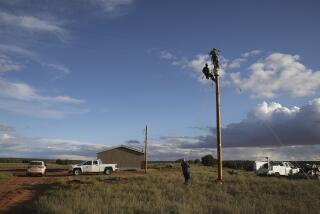A Serious Spin on ‘Use It or Lose It’
- Share via
WASHINGTON — Being fat and out of shape now has a name--sedentary death syndrome.
A professor at the University of Missouri-Columbia said he invented the term to drive home his point that, in the United States, even the Grim Reaper is flabby.
Frank W. Booth hopes to use the coinage, which he shortens to SeDS, to make the public and the federal government pay more attention and spend more money on getting the public to be more active.
“We knew that there were approximately 250,000 people in the United States each year dying of inactivity-related diseases,” but the phrase inactivity-related disease lacks pizazz, Booth said. Without a catchy name, the condition wasn’t getting enough attention, he said.
“One day while I was out jogging, it hit me: Why not call it SeDS?” Booth said.
Since Booth’s epiphany about two months ago, SeDS has been waiting for its official unveiling, which it got at a briefing for reporters in Washington. Most of Booth’s backers, about 40 strong, had taken a day trip from Baltimore, where the American College of Sports Medicine was holding its annual meeting.
Researchers Against SeDS, the organization that Booth founded, and which he funds out of his own pocket, called for an increase in federal support for research.
Booth wants to retain or increase current funding for the Centers for Disease Control and Prevention’s physical activity and nutrition program. The new federal budget would cut funding, he said. And he said the government in general should double the current 2% of annual health care expenditures that is spent on prevention.
Booth also called for the National Institutes of Health to create more programs that would focus on SeDS research.
Although the scientific consensus is strong that a lack of physical activity raises the risk of several fatal diseases, Booth conceded that his estimate of a quarter of a million fatalities is not firm.
The figure is an extrapolation, based on estimates that 750,000 Americans a year die of heart disease, diabetes and colon cancer, and on research that concluded that one-third of those deaths could be prevented by physical activity, Booth said.
“It’s such a big number, and it’s so new,” so it will take some effort to make America give SeDS the respect it deserves, Booth said.
To help SeDS get that respect, Booth’s fledgling organization recruited Margo G. Wootan, director of nutrition policy at the Center for Science in the Public Interest, one of Washington’s larger advocacy groups, to speak at the briefing.
“With all the environmental factors that reduce physical activity, it takes more than willpower to be physically active,” Wootan said. Government agencies should take some of the ease out of modern living so physical activity improves as an option, she said.
“Our bodies were designed to be physically active,” said Scott Gordon of East Carolina University. The trouble is that hard work, from farming to simply doing household chores without appliances, is no longer part of ordinary life for most people, he said.
Gordon called for activity to be put back in. “In adults, this may mean planning exercise into your daily routine,” he said. “However, it may be as simple as taking the stairs instead of the elevator a couple of times a day.”
Booth and his supporters said a special effort must be made to reach children, so they won’t turn fat and weak like their parents and, also like their parents, get sick and die early.
“Perhaps the greatest tragedy is that ailments previously associated with the middle-aged and older population will now affect our children, and will serve to drastically decrease their quality of life,” said researcher Ron Gomes of the University of Delaware.
Type II diabetes, also known as adult-onset diabetes, has increased tenfold from 1982 to 1994 among the young, and one-third of all new cases are among people ages 10 to 19, Gomes said.
On the Net:
Frank W. Booth’s SeDS site: https://www.ridinactivity.org/
default.htm





